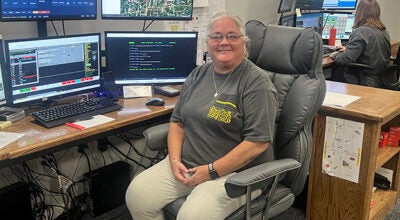Companies courting Lincoln County for trash pickup — Alabama company says collect in-house, supervisors say ‘no’
Published 9:14 pm Tuesday, March 20, 2018
An Alabama-based equipment company wants Lincoln County supervisors to get into the garbage collection business for themselves, but the board doesn’t really want to get that dirty.
Representatives from Pelham, Alabama’s Ingram Equipment Co. Monday made their presentation to the board, passing out flyers and pushing information on the possibility of Lincoln County purchasing the company’s specialized garbage trucks and performing trash pickup services in-house. But the high cost of the trucks and the need for hiring, training and insuring local operators seemed to make supervisors wilt in their seats, and off-hand discussions later in the meeting clearly explained how the board feels about getting into the garbage business.
“No, no, no,” District 3 Supervisor Nolan Williamson said to laughter as the meeting adjourned.
Supervisors took no action on Ingram’s proposal, the first of what will surely be numerous sales pitches this year from regional garbage companies drawn to the opportunity of an open contract this fall. Word of supervisors’ disappointment with current trash pickup provider Waste Pro has hit the streets, and several companies are jockeying for the new contract the board expects to award for Oct. 1.
But the cost of purchasing the company’s trucks was a major turnoff for supervisors. Ingram’s single-operator models require special garbage cans to fit a lift system — like the Waste Pro cans distributed to Brookhaven residents — and cost from $250,000 to $300,000 each.
Ingram General Manager Keith Johnson estimated Lincoln County would need three trucks to run all its routes — almost $1 million worth of equipment, not counting breakdowns, proposed maintenance contracts, rental costs and perhaps even a standby vehicle.
Even if supervisors had $1 million to spare for garbage collection, they are conscious of the political aspect of being in charge of that thankless task.
“Right now, Waste Pro or Waste Management gets thrown under the bus. If the board decided to do this, the board would be thrown under the bus,” said Lincoln County Chancery Clerk Tillmon Bishop.
Trash pickup is also something supervisors don’t want to supervise.
“Do y’all have a man around from 9 to 5 to make sure they’re picking up garbage like they’re supposed to?” asked District 2 Supervisor Bobby Watts.
Williamson shook his head and tapped his chest.
“’Nuh-uh — that’s us,” he said.
Johnson said there is a nationwide trend of municipalities taking over trash pickup. One of Ingram’s clients — the City of Alabaster in Alabama — runs its own garbage and recycling services.
“You’re going to get phone calls either way, so you might as well control it,” he said.
Supervisors do not seem interested, though they tried to be polite about it. When District 1 Supervisor Jerry Wilson, the board president, called on other supervisors for their opinion, they all muttered something about having to “look at it and see.”





